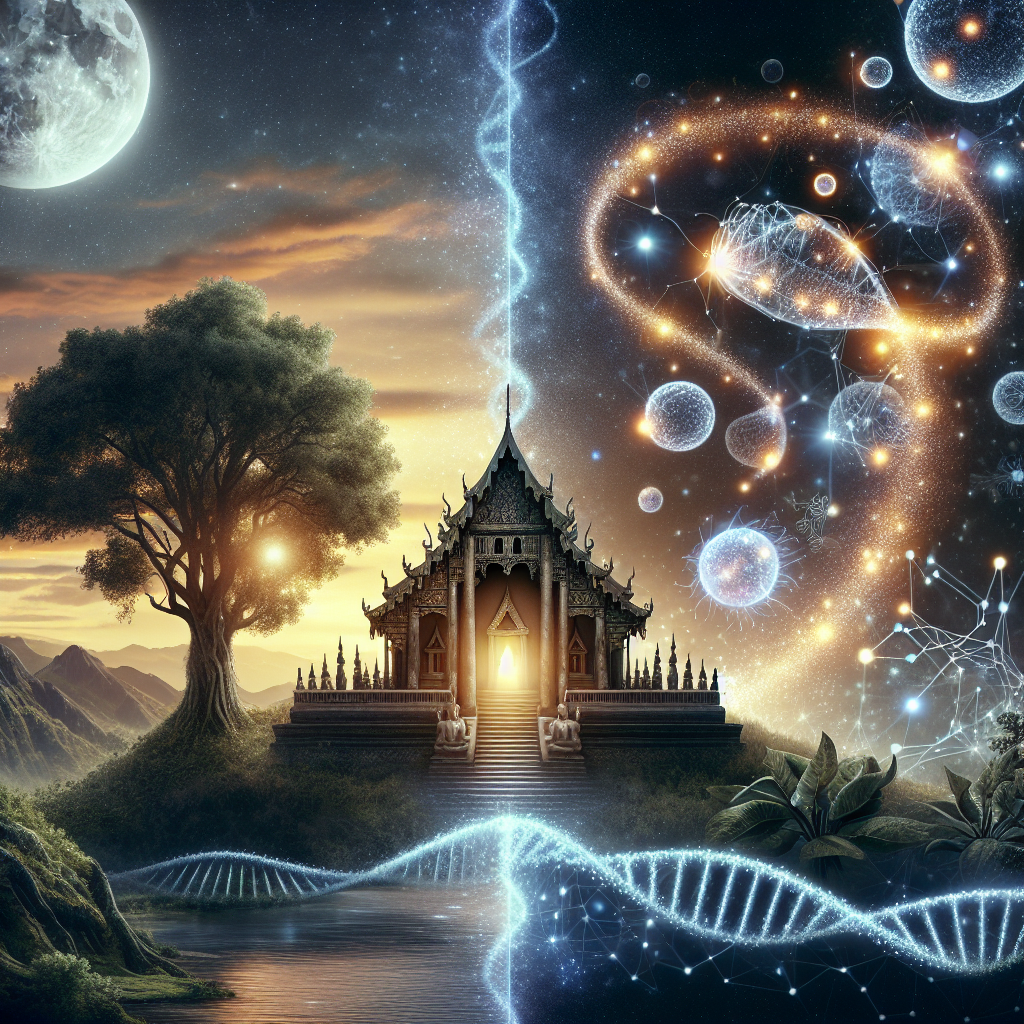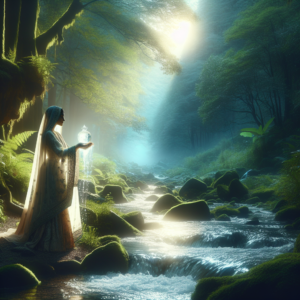Spiritual Devotional about Spirituality and Science
Title: Embracing the Harmony of Spirituality and Science: A Journey Toward Greater Understanding
Hello, Beautiful Souls!
As we navigate this fascinating journey called life, we often find ourselves standing at the crossroads of spirituality and science. At times, these two profound realms can seem worlds apart, but today, let’s explore how they can harmonize beautifully and inspire our hearts and minds.
The Symphony of Faith and Reason
Our wondrous universe, filled with mysteries and miracles, invites us to blend the rationality of science with the profound wisdom of spirituality. Just as a symphony reaches its full glory when each instrument plays in perfect harmony, so too our understanding of life deepens when we allow faith and reason to intertwine.
In the Bible, we find timeless principles that encourage both spiritual and intellectual pursuits. One of my favorite verses is Proverbs 1:7, which says, "The fear of the Lord is the beginning of knowledge; fools despise wisdom and instruction." Here, we see an invitation to seek knowledge—a pursuit that is equally embraced by both science and spirituality.
The Wonders of Creation
Consider for a moment the splendor of creation. The heavens declare the glory of God, and the sky above proclaims His handiwork (Psalm 19:1). Those who gaze through a telescope at the night sky or peep through a microscope to explore the intricacies of a single cell can attest to the sheer marvels that science reveals. Each scientific discovery, rather than diminishing the Creator’s grandeur, magnifies it, showcasing the layers of complexity and beauty we are blessed to uncover.
Albert Einstein, one of history’s brightest minds, once said, "Science without religion is lame, religion without science is blind." This profound statement encourages us to balance our spiritual perspectives with scientific understanding, enriching our journey of faith and inquiry.
Faith as a Catalyst for Discovery
Faith and science do not have to be at odds; in fact, they can fuel each other. Many pioneers of science were deeply spiritual individuals. Their faith did not hinder their scientific curiosity—it inspired it. Copernicus, Kepler, Galileo, Newton—these great thinkers saw their scientific work as a way to honor and understand God’s creation better. Their profound belief in an orderly universe created by a rational God led them to uncover some of the most foundational principles of science that we rely on today.
Embracing Both Paths
It’s important to nurture both our spiritual and scientific inclinations. Here are some ways you can blend the two in your daily life:
-
Reflect on Nature: Spend time in nature, whether it’s a walk in the park, a hike in the mountains, or simply watching the stars. Meditate on the beauty around you and the intricate design behind it. Let it inspire both your faith and curiosity.
-
Study the Word and the World: Dedicate time to studying the Bible and learning about scientific discoveries. Allow the insights from both to enlighten your understanding of life and existence.
-
Engage with Community: Share your thoughts, questions, and discoveries with friends, family, or community groups. Healthy discussions can deepen everyone’s appreciation for the wonders of faith and science.
-
Pray and Explore: Pray for wisdom and seek knowledge. Ask God to open your mind to new understandings and perspectives. God’s creation is vast and the more you learn, the more you can appreciate His infinite majesty.
A Journey of Wonder
In Matthew 22:37, Jesus tells us to "Love the Lord your God with all your heart and with all your soul and with all your mind." This holistic approach encourages us to embrace all aspects of our being—emotional, spiritual, and intellectual.
As we journey through life, let’s joyfully explore the wonders of both spirituality and science. Each step we take can lead us to a deeper appreciation of God’s magnificent creation and the incredible ways He reveals Himself to us.
Stay curious, stay faithful, and continue to be amazed by the beauty that unfolds when spirituality and science walk hand in hand.
Blessings,
[Your Name]
Explore and dig up answers yourself with our BGodInspired Bible Tools! Be careful – each interaction is like a new treasure hunt… you can get lost for hours 🙂
Q&A about Spirituality and Science
Sure, here’s a series of questions and answers that merge the themes of spirituality and science.
Q: Can spirituality and science coexist?
A: Yes, many people find that spirituality and science can coexist. While science focuses on understanding the natural world through empirical evidence and testable explanations, spirituality often concerns individual experiences, beliefs, and a sense of connection to something greater than oneself. Some argue that spirituality offers a qualitative, deeply subjective insight into human experience, whereas science provides a quantifiable, objective understanding of the universe.
Q: How does the concept of consciousness bridge spirituality and science?
A: Consciousness remains one of the greatest mysteries in both science and philosophy. From a scientific standpoint, consciousness is often studied through neuroscience and psychology, which seek to understand how brain processes give rise to subjective experiences. From a spiritual perspective, consciousness may be viewed as the fundamental essence of being or even a connection to a higher power. The study of consciousness allows for interdisciplinary dialogue, exploring both the biological underpinnings and the existential implications of our mental experiences.
Q: What is the role of meditation in linking science and spirituality?
A: Meditation is a practice that is rooted in many spiritual traditions and has garnered significant scientific interest in recent years. Scientifically, meditation has been shown to bring about changes in brain structure and function, reduce stress, and improve mental health. Spiritually, meditation is often used as a tool for introspection, self-awareness, and connecting with a deeper sense of self or the divine. The measurable benefits observed in scientific studies help bridge the gap between the spiritual practice and its physical and psychological impacts.
Q: How do quantum physics and spirituality intersect?
A: Quantum physics often explores phenomena that defy everyday experience, such as particle-wave duality and entanglement, leading some to draw parallels with spiritual concepts. For instance, the idea that particles can exist in multiple states simultaneously has been likened to the spiritual notion of a unified, interconnected universe. However, it’s important to note that mainstream scientists caution against misinterpreting quantum mechanics to support spiritual claims without empirical evidence. The intersection remains largely speculative but rich for philosophical discussion.
Q: Are there scientific studies that validate spiritual experiences?
A: There have been numerous scientific studies examining the effects of spiritual experiences on the brain and body. Using neuroimaging techniques, researchers have observed changes in brain activity associated with spiritual or mystical experiences. Studies have also correlated these experiences with improved mental health, enhanced well-being, and increased life satisfaction. While these findings do not "prove" the spiritual content, they validate that these experiences have a real, measurable impact on individuals.
Q: Can science explain the concept of the soul?
A: The concept of the soul is inherently a spiritual or religious one and does not fit easily into the scientific paradigm, which relies on empirical evidence and testable hypotheses. Science does not currently have a method for proving or disproving the existence of the soul. Nonetheless, discussions about the soul often touch on themes of consciousness, identity, and what it means to be human, areas where science and spirituality can engage in meaningful dialogue.
Q: How can scientific discoveries inform spiritual beliefs?
A: Scientific discoveries can influence spiritual beliefs by expanding our understanding of the universe and our place within it. For example, the vastness and complexity revealed by cosmology can inspire a sense of awe and wonder, which are profoundly spiritual feelings. Additionally, understanding the interconnectedness of life on Earth through biology and ecology can reinforce spiritual beliefs in the sanctity and unity of life. These insights can lead to a deeper appreciation of existence and foster a sense of interconnectedness and responsibility.
Q: What role does skepticism play in spirituality and science?
A: Skepticism plays a crucial role in both science and spirituality by encouraging critical thinking and the questioning of assumptions. In science, skepticism fosters rigorous testing of hypotheses and validation of results. In spirituality, skepticism can lead to a deeper exploration of beliefs and spiritual practices, ensuring they are meaningful and authentic. Healthy skepticism allows for growth, deeper understanding, and the refinement of both scientific knowledge and spiritual insight.
I hope these Q&As provide a thoughtful exploration of the intersection between spirituality and science.


